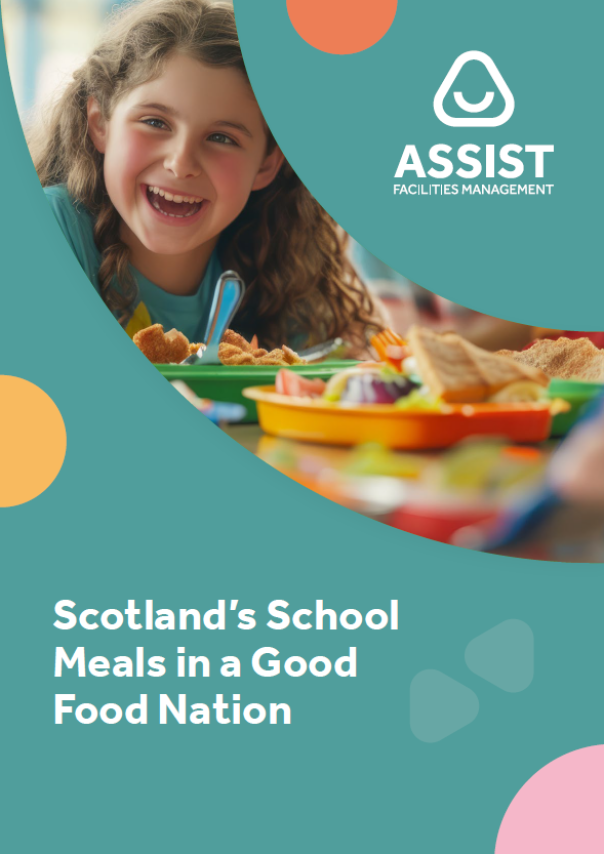
The Scottish Government has set out a vision for Scotland to be a Good Food Nation (GFN) where people from every walk of life ‘take pride and pleasure in, and benefit from the food they produce, buy, cook, serve, and eat each day’.
The Good Food Nation (Scotland) Act 2022 places duties on Scottish ministers, local authorities, and health boards, to produce Good Food Nation Plans.
These plans will set out the main outcomes that are to be achieved in relation to food-related issues, the policies needed to do this and the measures that will be used to assess progress.
The Good Food Nation timeline is that a National Plan is due to be published by Spring 2025, with local plans expected to be up and running by 2026.
Local Authorities must work out the impact of the changes they make, assess the financial impact, and their plans must show how they are to meet all the requirements of the GFN Act.
Now ASSIST FM, which represents all 32 Local Authority facilities management service providers across Scotland who together deliver over 450,000 meals every day, has published a policy paper to support Local Authorities in drawing up their own local plans.
It has sent copies of the document to all members as well as the Scottish Government, Cosla (the organisation for LA chief executives), all directors of education, and Third Sector partners such as Food for Life and Nourish.
Chris Ross, chair of ASSIST FM, emphasises the importance of local authorities starting to work on their local plans now.
“The policy document is a call to LA’s to understand that the work involved means you really need to start now to have local plans up and running by the deadline of 2026.
“We’re all starting from different points, so it doesn’t mean everything has to be achieved by then, but your plan should at least show how you plan to achieve the six outcomes.
“That is why the policy document is so important, because it highlights some examples of good practice where they already exist, and serves as a reminder that we should be ready to celebrate where local authorities are already achieving the GFN outcomes.
“It emphasises the importance of seeing school kitchens as whole food systems and the opportunities for food to play a broader role in schools and local communities, as well as the work of LA’s to build upon the Good Food Nation’s ambitions.
“It also explores the limitations of LA’s and the challenges surrounding sustainable and long-term funding, amongst a landscape of extremely challenging financial outlooks by many.
“The paper looks at some best practice exemplars from across Scotland and highlights the need for fair and equitable funding across local authority caterers to allow all them all to deliver upon the aims of the Good Food Nation.”
The paper offers a number of examples of good practice that could serve as models for other local authorities.
These include the 163 breakfast clubs that Glasgow City Council has set up across the city’s primary and secondary schools to help improve punctuality and help parents from low-income families.
Addressing issues of food provenance and sustainability, Dumfries and Galloway Council has created its ‘Naturally D&G’ sustainable school meals food strategy, which involves operating a central buying and distribution store that helps reduce food miles and carbon emissions because small and medium local suppliers don’t have to deliver across the region.
And South Lanarkshire Council’s award-winning Waste Warrior Campaign has already shown how it reduces food waste and fosters environmental consciousness among pupils.
In East Renfrewshire the council’s Education Catering Service has for ten years offered the chance for young people to come into school kitchens and learn to cook.
And City of Edinburgh Council has worked with Catering and Facilities Management to deliver a programme of catered food hygiene courses to support the skills and knowledge of its 600 team members from across the city.
The Good Food Nation outcomes
- Outcome 1: Everyone in Scotland eats well with reliable access to safe, nutritious, affordable, sustainable, and age and culturally appropriate food.
- Outcome 2: Scotland’s food system is sustainable and contributes to a flourishing natural environment. It supports our net zero ambitions, and plays an important role in maintaining and improving animal welfare and in restoring and regenerating biodiversity.
- Outcome 3: Scotland’s food system encourages a physically and mentally healthy population, leading to a reduction in diet-related conditions.
- Outcome 4: Our food and drink sector is prosperous, diverse, innovative, and vital to national and local economic and social wellbeing. It is key to making Scotland food secure and food resilient, and creates and sustains jobs and businesses underpinned by fair work standards.
- Outcome 5: Scotland has a thriving food culture with a population who are interested in and educated about good and sustainable food.
- Outcome 6: Scotland has a global reputation for high-quality food that we want to continue to grow. Decisions we make in Scotland contribute positively to local and global food systems transformation. We share and learn from best practice internationally.